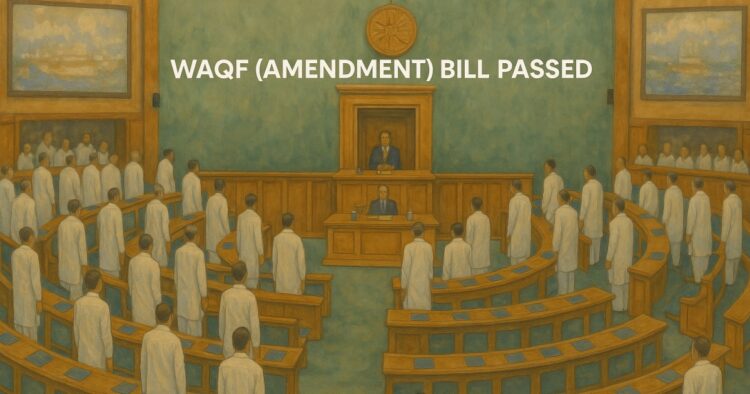KEY POINTS
- Only Muslims Can Now Donate Waqf Property; 2013 Change Reversed
- Converts Must Practise Islam for 5 Years Before Making Waqf Donations
- BJP Says Clause Prevents Property Misuse Through Forced Conversions
A five-year clause in the new Waqf (Amendment) Act, 2024, has shaken Parliament and ignited a fierce political debate – but is it truly controversial, or just inconvenient for those who once opened the floodgates? In 1995, the original Waqf Act clearly stated that only a Muslim could donate property for Waqf – an Islamic endowment made for religious or charitable causes. But in 2013, the then Congress-led UPA government tweaked this simple and clear provision. They amended the law to allow any Indian citizen, regardless of religion, to donate property to Waqf boards. In a secular country, this raised more questions than it answered. Why would someone from another religion donate land to an Islamic body whose control and usage would be governed by Islamic law?
Fast forward to 2025, the Narendra Modi-led BJP government has reinstated the original spirit of the 1995 Act, and perhaps gone one step further to ensure that land or property is not being used as a tool for manipulation or forced religious conversion.
The controversial yet crucial addition in the 2025 amendment is that only a person who has been practising Islam for at least five years can donate property as Waqf. Born Muslims can donate any time, but new converts must wait. Why? Because there have been many suspicious cases of sudden conversions allegedly carried out for the sole purpose of handing over property to Waqf, which is irreversible, as per Islamic law.
READ MORE: How one law passed in 1995, worsened in 2013, was finally corrected in 2025
“There have been numerous instances in recent years when people have been converted solely with an eye on their property,” a BJP MP said anonymously, giving voice to what many think but few dare to say aloud.
This is not just a clause, it is a protection against exploitation. It is a safeguard against orchestrated conversions, where individuals may not even understand the full implications of becoming a Muslim or donating Waqf. A five-year wait period ensures that only genuinely practising individuals can take such a significant step, and not people under coercion or momentary influence.
Yet, this logic is what the opposition is unwilling to accept. Congress MPs like Syed Naseer Hussain and TMC leaders such as Nadimul Haque stood up in Parliament to question how the government would determine if someone has been a “practising Muslim” for five years. AIMIM’s Asaduddin Owaisi went a step further, mocking whether a beard or cap would be the identifiers. Congress’s Supriya Shrinate asked if CCTV cameras would be installed in Muslim homes.
But let’s ask a simple counter-question: Why is the opposition so uncomfortable with a clause that ensures no one is deceived into a permanent, religiously governed donation? If there’s nothing to hide, why fear the five-year wait?
It is important to note that the Waqf land portfolio ballooned suspiciously post-2013, the year Congress amended the law to allow non-Muslims to donate. According to Union Home Minister Amit Shah, Waqf boards owned 18 lakh acres of land from 1913 to 2013. But between 2013 and 2025 alone, 21 lakh additional acres were claimed. These numbers do not lie. They reflect a dangerous trend that the new law seeks to curb.
The 2025 amendment, passed after marathon debates in both Houses and receiving the President’s nod on March 5, intends to bring transparency and accountability back into the system. It puts the brakes on overnight conversions and suspicious property transfers, and ensures Waqf donations come from people who truly understand the faith, not those caught in webs of manipulation.
Yes, the implementation rules are yet to be notified. And yes, clarity will be needed on what qualifies as five years of “practising Islam”, but that doesn’t make the intent any less honest or logical.
If the 2013 Congress amendment was about loosening the gates, the 2025 BJP amendment is about tightening them for the right reasons. The five-year clause might be uncomfortable for those who thrive in loopholes, but for a nation that values transparency in land ownership, religious integrity, and prevention of exploitation, it is not only justified, it is necessary.
The Waqf Act is not just about land. It is about who controls it, why they control it, and what faith truly means when it intersects with legal, irreversible donations.

















Comments